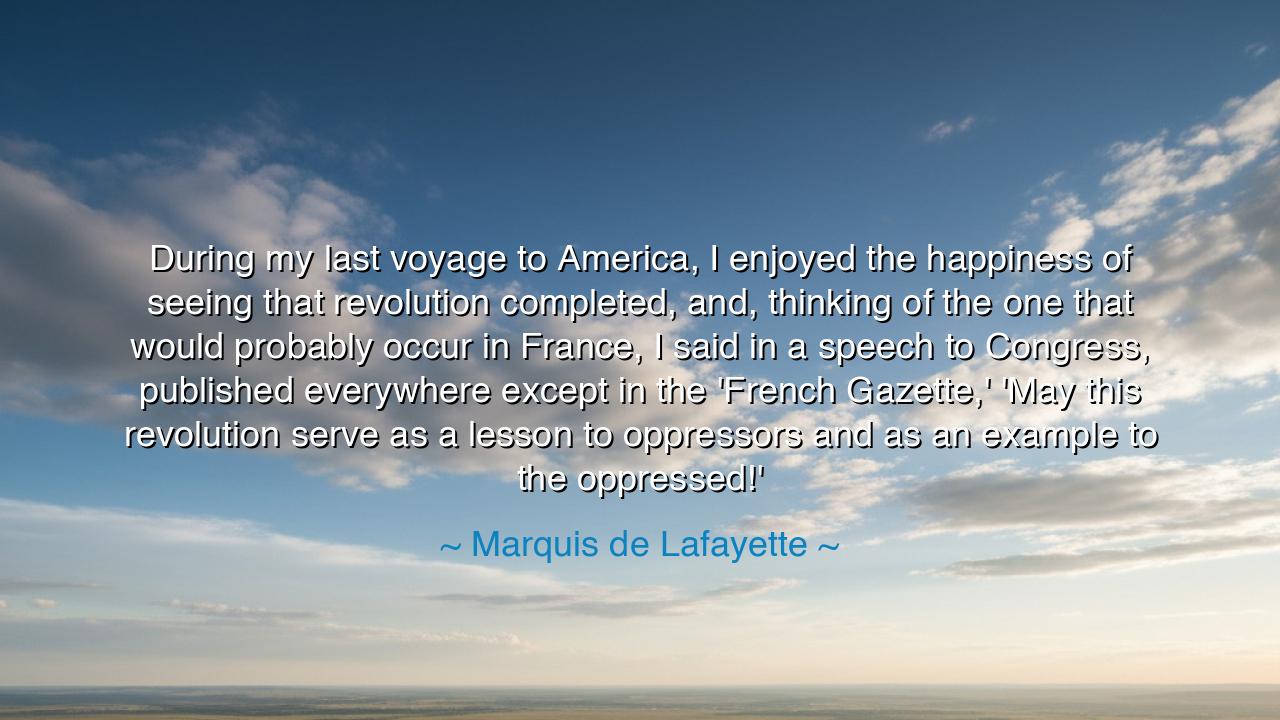
During my last voyage to America, I enjoyed the happiness of
During my last voyage to America, I enjoyed the happiness of seeing that revolution completed, and, thinking of the one that would probably occur in France, I said in a speech to Congress, published everywhere except in the 'French Gazette,' 'May this revolution serve as a lesson to oppressors and as an example to the oppressed!'






In the immortal words of Marquis de Lafayette, hero of liberty and son of two revolutions, we find a call that resounds through the ages: “During my last voyage to America, I enjoyed the happiness of seeing that revolution completed, and, thinking of the one that would probably occur in France, I said in a speech to Congress, published everywhere except in the 'French Gazette,' ‘May this revolution serve as a lesson to oppressors and as an example to the oppressed!’” These words were born not from theory or distant reflection, but from the beating heart of a man who had lived the struggle for freedom, who had seen the birth of a nation, and who foresaw the birth of another yet to come. They are the words of a warrior of principle—a man who carried the flame of liberty across the seas, hoping that its light would guide both rulers and the ruled toward a new dawn of justice.
Lafayette spoke as one who had witnessed the impossible become reality. In the American Revolution, he had seen ordinary men—farmers, blacksmiths, teachers—rise up against the might of an empire. He had fought beside George Washington, not for conquest, but for the sacred idea that men might govern themselves. When he returned to France, he carried more than medals and honors—he carried a vision. He saw in America a revolution not of vengeance but of virtue, not of chaos but of conviction. And so, when he stood before the Congress, he prayed that this triumph of freedom might be both a warning to those who would oppress and a beacon to those who suffered under tyranny.
The origin of these words lies in that moment when the fires of revolution still glowed fresh, when the old world trembled before a new idea—that the right to rule did not flow from crowns or divine decrees, but from the consent of the governed. Lafayette understood that this idea, once kindled, could not be confined to one land. He saw that the same spirit that had crossed the Atlantic to inspire America would, in time, awaken France. His hope was that France, too, might find freedom without falling into madness—that she might follow the example of America’s steadiness, not the chaos of destruction. But he also knew the danger: that the oppressors of Europe, deaf to mercy, would ignore the lesson and force the oppressed to rise in fury.
Indeed, history proved his words prophetic. When the French Revolution came, it was both the fulfillment of Lafayette’s hope and the heartbreak of his warning. The oppressed took courage from the American example, but the oppressors—kings, nobles, and the old order—refused to yield. And so the storm broke. The streets of Paris ran red, and though liberty was born, she came screaming into the world through pain and blood. Lafayette himself, ever the voice of moderation, was caught between two fires—hated by tyrants for his devotion to freedom, and by extremists for his restraint. Yet even in the ruins of that chaos, his words endured. They remained a torch, passed from hand to hand, a reminder that every revolution carries within it both the promise of enlightenment and the peril of darkness.
The lesson to oppressors, as Lafayette declared, is eternal: power built upon injustice cannot stand. No throne, no army, no empire can long endure the weight of human misery. The oppressed may bow for a time, but the soul of man will always remember its dignity. Sooner or later, the cry for freedom will rise like thunder, and no wall will hold it back. Yet his words also offer a sacred example to the oppressed—that liberty must not become license, that justice must not become revenge. True revolution is not born from hatred, but from love—the love of fairness, of humanity, of the eternal right to breathe free.
We see this lesson echoed again and again through history: in the marches of Gandhi, who fought oppression through peace; in the dream of Martin Luther King Jr., who sought justice without bitterness; in the fall of empires, where the oppressed lifted their heads and declared their humanity. In every age, the same truth unfolds: oppression breeds revolt, but only courage guided by wisdom brings lasting freedom. Lafayette, the bridge between two worlds, knew this balance. His voice still urges us to fight without cruelty, to rise without hatred, and to build freedom upon reason, not rage.
Let this be your teaching, children of liberty: do not wait for others to learn the lesson of oppression, and do not forget to embody the example of the oppressed who rise with honor. Stand against injustice wherever it festers, but do so not as destroyers, but as builders of a more righteous world. When you see cruelty, speak. When you see tyranny, resist. But remember always that the end of oppression is not vengeance—it is renewal.
And so, let Lafayette’s words ring again across the centuries: May every revolution—of nations, of hearts, of minds—serve as a lesson to oppressors and an example to the oppressed. For only then shall the dream that carried him across the oceans, through battles and prisons, live on—the dream that freedom, once awakened, can light the world for all humankind.






AAdministratorAdministrator
Welcome, honored guests. Please leave a comment, we will respond soon